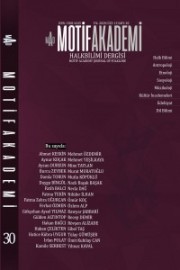TÜRK DÜNYASI HALK EDEBİYATINDA OBA İNANCI
THE BELIEF OF NOMADIC TENT IN THE FOLK LITERATURE OF THE TURKIC WORLD
Author(s): Rövşen AlızadeSubject(s): Customs / Folklore, Turkish Literature, Turkic languages
Published by: Motif Halk Oyunları Eğitim ve Öğretim Vakfı
Keywords: Nomadic tents; interpretation; mythological aspects; world model; epic of Oghuz;
Summary/Abstract: This article attempts to examine critical issues regarding naming and definition of nomadic tent belief among the peoples of Turkic World and assesses the said belief’s place and significance in the folk literature of the Turkic peoples. It was mentioned that the functionality of “Nomadic Tent” from the linguistic perspective, in fact emerged as an integrity of semiotic indication; and it was emphasized that some phonetic characteristics of this phenomena are related to space and place. It was made clear that the effect of space and place notions on the mythological aspect of motherland and the reflection of the mythological aspects of motherland concept on the epic of Oghuz as the outcome of this effect. It was recorded that the concept of Nomadic Tent covers meanings of genealogy, community, rubble, soil, cairn, tombstone, tent, etc. and that this phenomenon has taken place as a significant factor in motherland concept’s gaining holiness and it was underlined that the phenomenon of motherland is directly related to the mythological units . The article stated the functionality of mythological concepts and insights with which the belief of Nomadic Tent is related within the scope of the mythological though of the Turkic World, on the other hand some other mythological characters’ connection with the facts that broke off from the “nomadic tent”. The varieties of rituals and ceremonies among the Turkic peoples were mentioned and the arguments were supported with the samples extracted from the Dede Korkut Epic (“Kitab-i Dede Korkut”). The article draw attention to the fact that these rituals and ceremonies are like plays, and the researchers’ findings regarding the infinity of such plays are provided as quotations. Furthermore, pavillion (“otağ”) and tent (“çadır”) concepts matched with nomadic tent cult are mentioned in the Oghuz epic as a characteristic of a house and it was proved that it symbolized the model of mythical world. Some sample have been provided from the belief systems of Hakas Turks regarding the matters between the sky and the tent, and clear comments are given on rituals of mythical world model in the Oghuz epic.
Journal: Motif Akademi Halkbilimi Dergisi
- Issue Year: 13/2020
- Issue No: 30
- Page Range: 670-679
- Page Count: 10
- Language: Turkish

